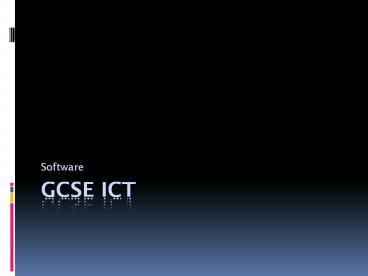GCSE ICT PowerPoint PPT Presentation
1 / 24
Title: GCSE ICT
1
GCSE ICT
- Software
2
What is software?
- Software is the name given to all the programs
that run on computer hardware. - There are two main types of software
- Operating software (also known as systems
software) - Applications software
3
Operating systems
- An operating system is a program that controls
the hardware. - Operating systems perform the following tasks
- They assist applications software to communicate
with the hardware (e.g. allow a word processed
document to be printed) - They manage the system resources (e.g. allocate
CPU time to the tasks being undertaken)
4
Operating systems
- They manage the transfer of data to and from the
systems peripheral devices (e.g. keyboard, mouse,
scanner, printer) - They manage system security (e.g. allocating
restricted rights to users to do certain things)
5
Operating systems
- Examples of operating systems include
- Windows XP
- Windows Millennium Edition
- Windows 2000
- Windows NT
- UNIX
- OS/2
6
Operating systems
The operating system acts a a shell around the
hardware. The applications software need an
operating system to work, and users need the
applications software to interact with the
hardware via the operating system.
Application
Operating system
User
Hardware
Application
Application
User
User
7
Multitasking
- Multitasking is the ability to do more than one
thing at a time. - If an operating system can multitask, it enables
a computer system to do several things at the
same time (e.g. A user can print a document
whilst reading their emails).
8
Multiuser
- A multiuser facility allows more than one user to
access data or an application program at the same
time. - Without a multiuser facility in an operating
system it would be almost impossible for a
network to function.
9
User interfaces
- The way in which the user of a computer
communicates with the machine is called the
Human-Computer Interface or User Interface. - This is an important function of an operating
system.
10
User interfaces
- A good human-computer or user interface needs
- To be user friendly
- To be attractive to use
- To be effective
- To be easy to use
11
User interfaces
- A user friendly interface should make it possible
for the user to use the software without having
to read the entire manual first! - An interface that is attractive to use will
encourage users to use the software.
12
User interfaces
- An effective interface will do its job
efficiently. - An easy to use interface will have menu
structures that are consistent in design and
layout across several different software packages
(e.g. the fast save option will be in the same
place on the toolbar and have the same icon).
13
User interfaces
- GUIs (also known as Icons).
- Toolbars.
- Drop-down menus.
- Pop-up menus.
- Combinations of the above.
14
Graphic User Interfaces
- Graphic user interfaces (also known as GUIs) are
usually called ICONS. - GUIs are small pictures that represent actions,
and they can be selected by clicking on them
with the mouse.
15
Some examples of GUIs
GUIs or Icons that will activate particular
programs
Microsoft Word
Outlook Express
16
Some examples of GUIs used with a toolbar
GIUs or Icons that will activate particular tools
on a Toolbar
Text Justification
Clipboard
Fast Save
17
Some examples of toolbars
Microsoft Word
Microsoft Excel
Microsoft Access
Note the use of GUIs or Icons that are common to
all the toolbars
Fast Save, Print, and Print Preview
Examples include
Help
18
Some examples of drop-down menus
Note that options that are not available are
greyed or ghosted
19
Some examples of pop-up menus
The Microsoft Windows Start Menu pops up when
the Start button is pressed
The AutoShapes Menu in Microsoft Word pops up
when the AutoShapes button is pressed
20
Other forms of interface
- All the examples shown so far have been point
and click device driven. - There are, however, other forms of interface that
are command and key driven.
21
An example of a command driven interface
Before the introduction of GUIs by Apple Mac and
Microsoft, computers had to be given commands in
DOS. These were typed in, and often used
abbreviations.
This example is the command used to view the
directory of all the programs and files in
Windows.
22
An example of a key driven interface
This example is taken from the Microsoft Word
Toolbar.
For example
Pressing the Alt and f keys at the same time
selects the File option.
Besides being able to select a command by
clicking on the appropriate word with a mouse,
these options can also be selected by the use of
the keyboard.
Pressing the Alt and o keys together at the
same time selects the Format option.
23
Utility programs
- Utility programs are often included with the
operating system although some such as
antivirus programs often have to be purchased
separately. - Utility programs perform routine tasks that help
the user to get the most out of the system.
24
Utility programs
- Tasks that utility programs perform include
- Renaming files
- Listing files
- Deleting and copying files
- Sending files to the printer
- Sorting data
- Repairing damaged files
- Backing up files

